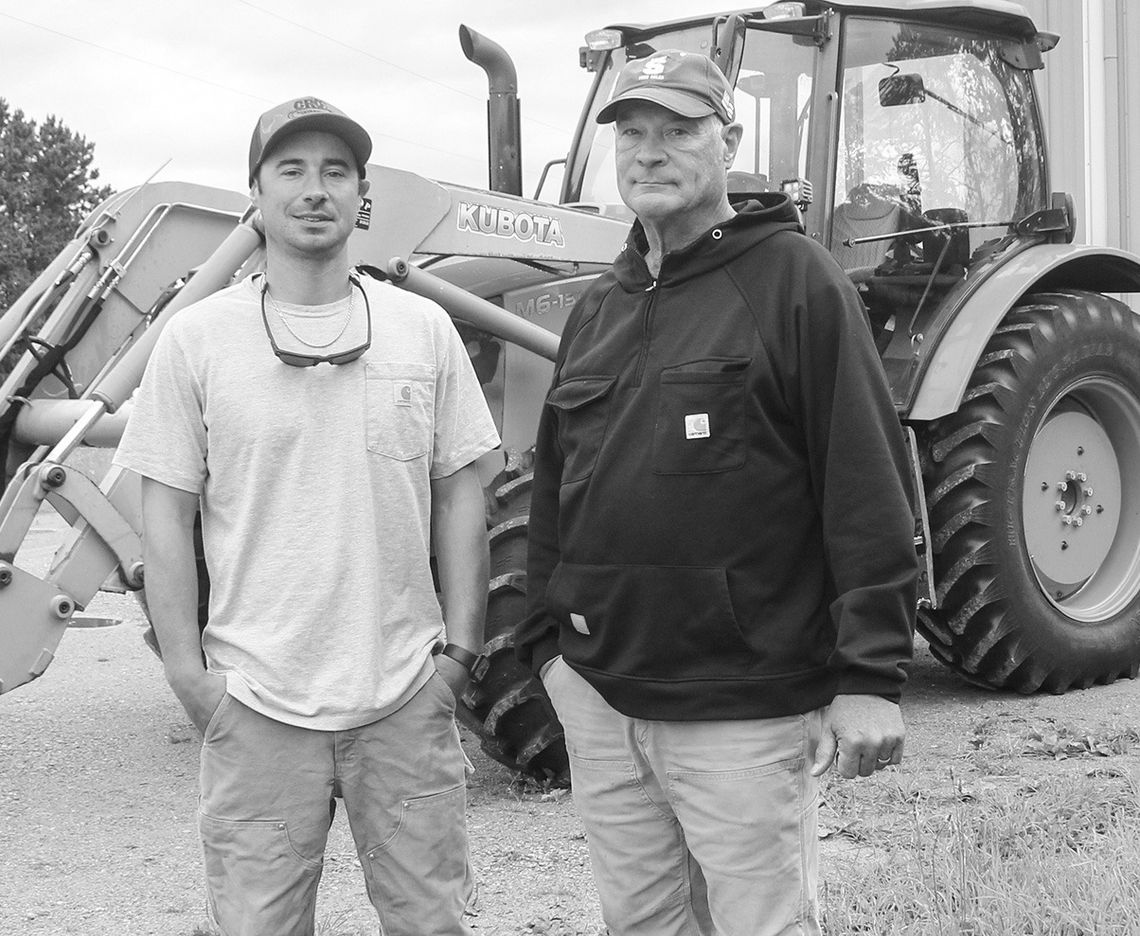Dan and Alex Wiesen are a father-son duo who have succeeded on the farm and beyond with their local business Empire Trellis.
No job is too big or too small for Empire Trellis, according to Alex.
“We come in with a crew, build whatever trellis for whatever crop you got from start to finish. And then we leave, you got a farm fully ready to go,” he said.
Empire Trellis opened in 2008 and specializes in complete turnkey trellis installations, along with the distribution of highquality building materials and equipment to farmers throughout the agricultural industry (apples, fencing, grapes, hops, labor).
They supply materials and broker posts all over the U.S.
“Material sales have become a huge part of our business ... We are supplying people for the following year for posts and wire and all the materials for their next spring projects, but then also getting all of our projects set up,” Alex said.
Dan along with his brother, Mike; Alex and friend John Stanz formed Empire Hops, one of the first commercial hop farms in Michigan in 2008 as well.
Dan studied agriculture in college and grew cherries, apples and asparagus until the mid-1990s when he turned his efforts toward custom carpentry. He owned a construction business for 22 years.
Dan remembers going through multiple phases with hops and having to rebuild the trellis three times until finally hiring somebody for the Pacific northwest that turned it around.
“That really turned the tables on that as far as making that efficient and doing a good job of it,” Dan said.
Alex built and managed the farm for a handful of years then dove head first into the trellis business.
Empire Trellis consults with both current and prospective growers to develop farms capable of delivering a first-class product to meet the demands of a growing market from installation, irrigation, or training of whatever crop a farmer needs. Along with serving locally they also travel across the U.S. and Canada.
Alex and his crew have traveled as far as Montana to Prince Edward Island doing installations. Dan holds down the fort back in Leelanau as he ages.
So far in 2024, Empire Trellis had projects in Wisconsin twice, down in Manistee, and recently finished an eight-week apple project in Leelanau County.
Apples have been the majority of planting, lately.
“We had to supply people with asparagus, strawberries and raspberries … then we would hops and then we’d go into do apples. Our people had a whole year’s worth of work all the time, which made it good for us, too. We could keep those people, and they liked it,” Dan said.
Dan explained that 2008 was a boom-time for hops until 2014 when apples started gaining in popularity. Now he thinks the future is trending more towards grapes with more vineyards growing locally compared to the struggling apple and cherry industry.
“Apples have been really big this year and grapes. We still do a few hop trellises a year. Not so much in Michigan, but a lot on the east coast, and Wisconsin seems to be doing well,” Alex said.
Dan explained the biggest challenges are getting paid for your crops fairly.
“That’s the biggest headache because we have no control over it. Prices are stated every year and by law they have to pay you within a certain amount of time. And neither the fresh apple industry nor the hop industry was like that. It was more on a consignment type thing,” Dan said and Alex added. “All the prices have gone up, labor’s gone up, chemicals have gone up, fertilizer has gone up, and what the farmer gets paid stays the same. So we’re eating all the costs and not getting paid anymore for it’s something that people definitely need to realize what’s going on.”
Alex admits that the fencing portion of the business has been a huge gap filler in terms of revenue.
“Anything from deer fencing, cattle fencing, horse fencing, (etc.) That’s been a good filler … it’s super efficient,” Alex said.
Trellises are structures used in farming to support climbing plants. They maximize space, improve air circulation, and increase sun exposure, leading to healthier crops and easier harvesting.
“Apples used to be freestanding trees, big trees, but it’s evolved now where a dwarfing rootstock is used. It’s a high tree number per acre, but they’re small trees,” Dan explained. “We have about 35 acres of high density apples, and we get as many apples off that 35 acres that we used to get off 400 acres here ... That’s how you stay in business because what we receive for apples is still the same as when I was 20 years old.”
Dan appreciates his relationship with Alex and is a firm believer that he’s going to know the business before he is gone.
“My dad died when I was 26. We didn’t know what the hell to do. We had no clue. He’s been pushed, but he gets better and better and better at it all the time, and it’s working out well.,” Dan said. “I don’t really want to stop. I just used to work a lot and I’m fine with it, but I would like it to tone down a little bit ... If we’re good and busy, that’s good. I don’t have to go and work on those crews.”
As Alex ages he recognizes the importance of family with two children.
“It’s just part of the gig and try to line them up and do it and not try to be away from home for too long,” he said. “I’m a firm believer there’s no reason to be away from your family.”
Dan throughout his life has prioritized the ability to change if you want to be a successful farmer.
“You have to keep evolving, just because you had an idea isn’t a guarantee that it’s going to work or that it will continue to work,” Dan said. “My original experience of doing contracts and quotes for construction has followed through. Now, Alex keeps really close detail and track of how long everything takes, what it costs. And because we’ve had a lot of different jobs we have a really good handle on what it truly costs, what we can quote is fair and that it comes out right.”









